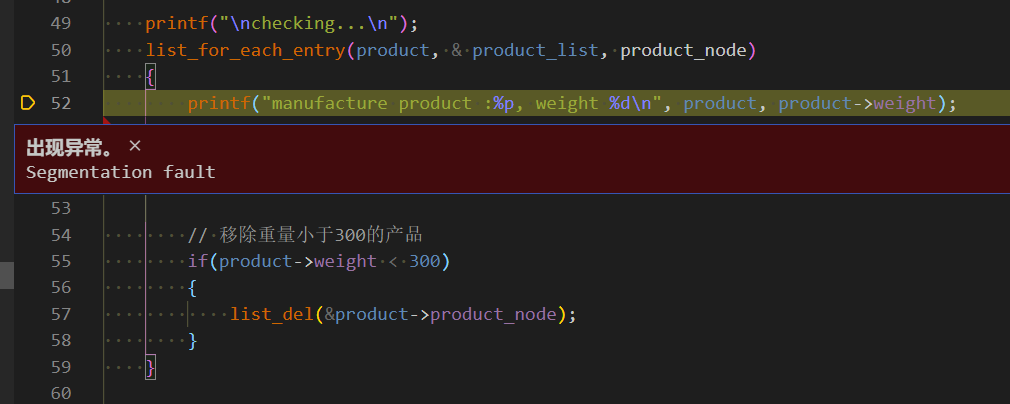安全函数不安全--多线程慎用list.h
安全函数不安全–多线程慎用list.h
絮絮叨叨: 一个 BUG 轻轻松松让我少了几个小时的睡眠时间!
前言
linux 开发应该多少都听过大名鼎鼎的 list.h ,其简洁优雅的设计,一个头文件完成了一个高可用的链表。
但是 list.h 并不是线程安全的,在多线程的情况下使用,必须考虑多线程数据同步的问题。
然而。。。。
我在使用互斥锁对链表的操作进行保护之后,还是被坑了!
下面是把我坑了的 list_for_each_entry 和 list_for_each_entry_safe 两个函数的详细分析。
list.h 单线程使用
在 list.h 这个文件中有非常多值得学习的地方,比如其最经典的 container_of 的实现。
在这里只介绍几个常用的函数,然后重点分析在多线程使用时的碰到的坑。
链表初始化及添加节点
首先定义一个链表和链表节点,定义一个产品,其属性为产品重量(weight)。
typedef struct product_s
{
struct list_head product_node;
uint32_t index;
uint32_t weight;
}product_t;
//初始化链表头
LIST_HEAD(product_list);
生产者在生产完产品后,将产品加入链表,等待消费者使用。
void producer(void)
{
product_t *product = malloc(sizeof(product_t));
// 产品重量为 300 ± 10
product->weight = 290 + rand() % 20;
printf("product :%p, weight %d\n", product, product->weight);
list_add_tail(&product->product_node, &product_list);
}遍历链表
使用 list_for_each_entry 可以将链表进行遍历:
// 遍历打印链表信息
void print_produce_list(void)
{
product_t *product;
list_for_each_entry(product, &product_list, product_node)
{
printf("manufacture product :%p, weight %d\n", product, product->weight);
}
}其具体实现是使用宏将 for 循环的初始条件和完成条件进行了替换:
#define list_for_each_entry(pos, head, member) \
for (pos = list_first_entry(head, typeof(*pos), member); \
&pos->member != (head); \
pos = list_next_entry(pos, member))其中for循环的第一个参数将 pos = list_first_entry(head, typeof(*pos), member); 初始化为链表头指向的第一个实体链表成员。
第二个参数 &pos->member != (head) 为跳出条件,当pos->member再次指向链表头时跳出for循环。
for的第三个参数通过pos->member.next指针遍历整个实体链表,当pos->member.next再次指向我们的链表头的时候跳出for循环。
但是 list_for_each_entry 不能在遍历的循环体中删除节点,因为在循环体中删除链表节点后,当前节点的前驱结点和后继结点指针会被置空。
在for循环的第三个参数中,获取下一个节点时,会发生非法指针访问

“安全遍历链表”
为了解决在遍历链表过程中,无法删除结点的问题,在 list.h 中提供了一个安全删除节点的函数
// 删除重量小于300的节点
void remove_unqualified_produce(void)
{
product_t *product, *temp;
list_for_each_entry_safe(product, temp, &product_list, product_node)
{
// 移除重量小于300的产品
if (product->weight < 300)
{
printf("remove product :%p, weight %d\n", product, product->weight);
list_del(&product->product_node);
free(product);
}
}
}其实现是使用一个中间变量,在开始每次开始执行循环体前,将当前节点的下一个节点保存到中间变量,从而实现”安全”遍历
#define list_for_each_entry_safe(pos, n, head, member) \
for (pos = list_first_entry(head, typeof(*pos), member), \
n = list_next_entry(pos, member); \
&pos->member != (head); \
pos = n, n = list_next_entry(n, member))多线程中使用list.h
上面我们在主线程里面创建了产品,并放入到链表中并,并过滤了重量小于300的产品。
后面我们在多线程中对产品进行消费(两个线程同时消费链表的数据,使用完成后删除并释放结点)。
这里的逻辑和单线程中的差不多,同样是遍历链表,然后从链表中删除节点。不同的是,由于list.h自身没有带锁,所以需要使用互斥锁将链表的操作进行保护。
于是很自然的有了下面的代码
void * consumer(void *arg)
{
product_t *product, *temp;
// 使用互斥锁对链表进行保护
pthread_mutex_lock(&producer_mutex);
list_for_each_entry_safe(product, temp, &product_list, product_node)
{
list_del(&product->product_node);
printf("consume product :%p, weight %d, consumer :%p\n", product, product->weight, (void *)pthread_self());
pthread_mutex_unlock(&producer_mutex);
// 睡一会,防止太快了
usleep(10*1000);
free(product);
pthread_mutex_lock(&producer_mutex);
}
pthread_mutex_unlock(&producer_mutex);
return NULL;
}在上面的这段代码中,在对链表操作时,使用互斥锁对链表进行了保护,使同时只能有一个线程访问链表。
不过你以为这样就好了嘛,如果时这样,这篇文章就没存在的必要了。。。

在两个线程同时遍历时,即便是加了锁之后,数据访问也不安全。
在遍历使用的 list_for_each_entry_safe 宏中,使用了一个零时变量对保存着当前链表的下一个节点。
但是多线程访问链表时,有可能零时变量保存的节点,被另一个线程删除了,所以访问的时候又是 Segmentation fault

后记
原因找到了,也就好办了。以至于解决方法嘛,我是使用一个全局的零时变量,将需要删除节点的下一个节点保存起来,手动实现多线程的”安全删除”。
// 消费者
void * consumer(void *arg)
{
product_t *product;
// 使用互斥锁对链表进行保护
pthread_mutex_lock(&producer_mutex);
list_for_each_entry(product, &product_list, product_node)
{
temp = list_next_entry(product, product_node);
list_del(&product->product_node);
printf("consume product :%p, weight %d, consumer :%p\n", product, product->weight, (void *)pthread_self());
pthread_mutex_unlock(&producer_mutex);
// 睡一会,防止太快
usleep(10*1000);
free(product);
pthread_mutex_lock(&producer_mutex);
if(temp != NULL){
product = list_prev_entry(temp, product_node);
}
}
pthread_mutex_unlock(&producer_mutex);
return NULL;
}一个晚上找到了这个bug,然后又花了一个晚上记录下来这个bug。
据说 klist.h 是 list.h 的线程安全版本,后面花时间在研究一下去,今天就先睡了。。。